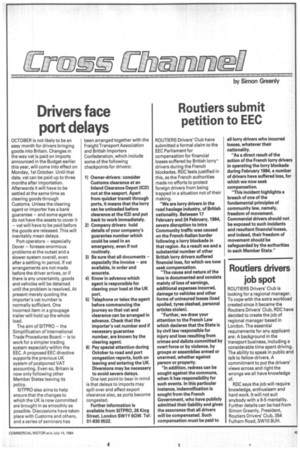Drivers face port delays
Page 51

If you've noticed an error in this article please click here to report it so we can fix it.
OCTOBER is not likely to be an easy month for drivers bringing goods into Britain. Changes in the way vat is paid on imports announced in the Budget earlier this year, will come into effect on Monday, 1st October. Until that date, vat can be paid up to three months after importation. Afterwards it will have to be settled at the same time as clearing goods through Customs. Unless the clearing agent or importer has a bank guarantee — and some agents do not have the assets to cover it — vat will have to be paid before the goods are released. This will inevitably mean delays.
Port operators — especially Dover — foresee enormous problems at the outset and a slower system overall, even after a settling in period. If vat arrangements are not made before the driver arrives, or if there is any uncertainty, goods and vehicles will be detained until the problem is resolved. At present merely quoting the importer's vat number is normally sufficient. One incorrect item in a groupage trailer will hold up the whole load.
The aim of SITPRO — the Simplification of International Trade Procedures Board — is to work for a simpler trading system especially within the EEC. A proposed EEC directive supports the previous UK system of postponed VAT accounting. Even so, Britain is now only following other Member States leaving its policy.
SITPRO also aims to help ensure that the changes to which the UK is now committed are brought in as smoothly as possible. Discussions have taken place with Customs and others, and a series of seminars has been arranged together with the Freight Transport Association and British importers Confederation, which include some of the following checkpoints for drivers: 1) Owner-drivers: consider Customs clearance at an Inland Clearance Depot (ICD) not at the seaport. Apart from quicker transit through ports, it means that the lorry can be unloaded before clearance at the ICD and put back to work immediately.
2) Company drivers: hold details of your company's guarantee number which could be used in an emergency, even if not routinely.
3) Be sure that all documents — especially the invoice — are available, in order and accurate.
4) Know in advance which agent is responsible for clearing your load at the UK port.
5) Telephone or telex the agent before commencing the journey so that vat and clearance can be arranged in advance. Check that the importer's vat number and if necessary guarantee number, are known by the clearing agent.
6) Pay special attention during October to road and port congestion reports, both on leaving and entering the UK. Diversions may be necessary to avoid severe delays. One last point to bear in mind is that delays to imports may spill over and affect export clearance also, as ports become congested.
Further information is available from SITPRO, 26 King Street, London SW1Y 6QW. Tel: 01-930 0532.
























































































